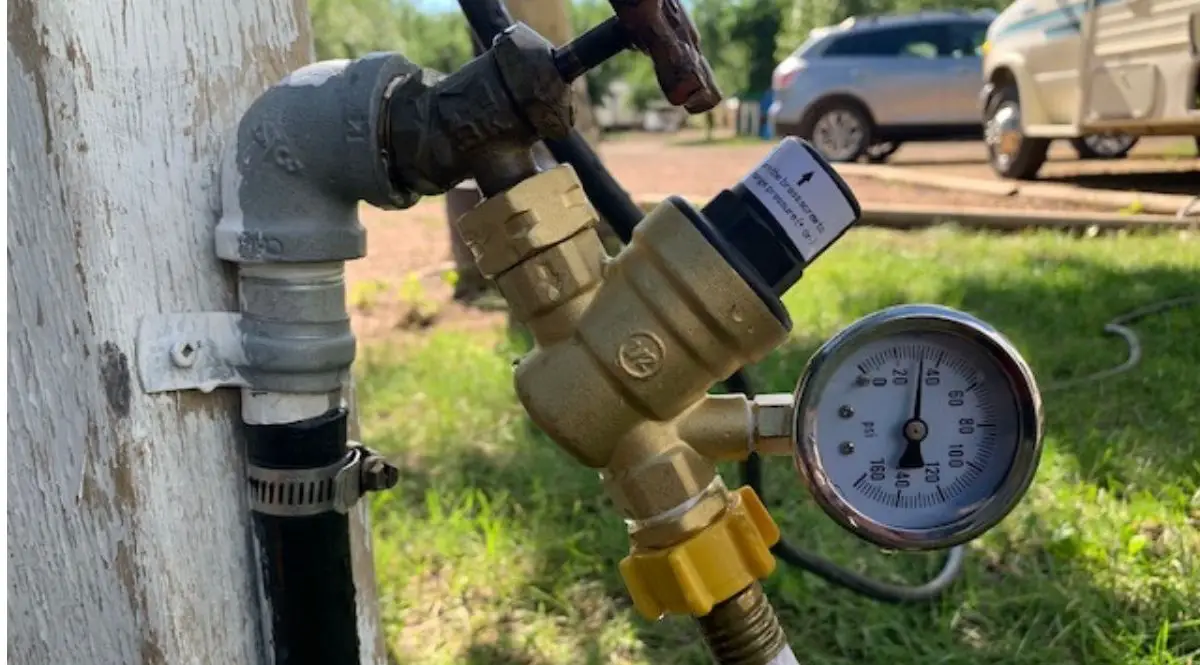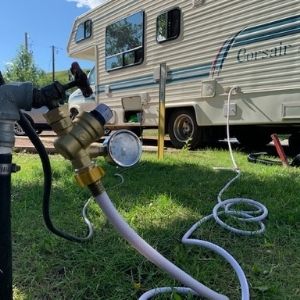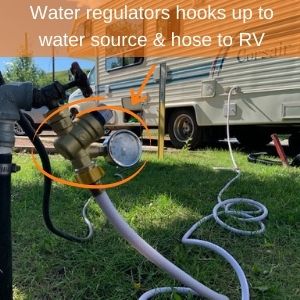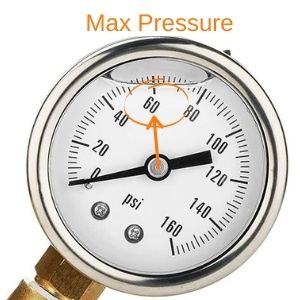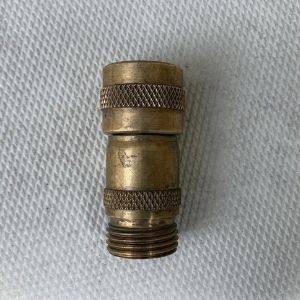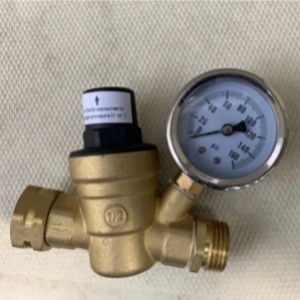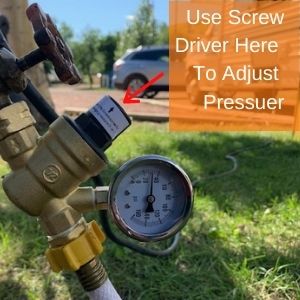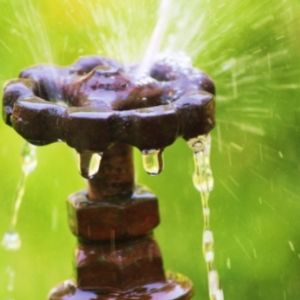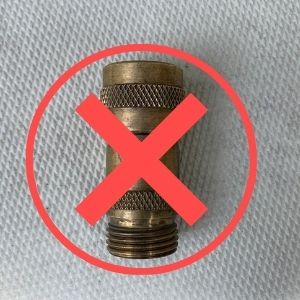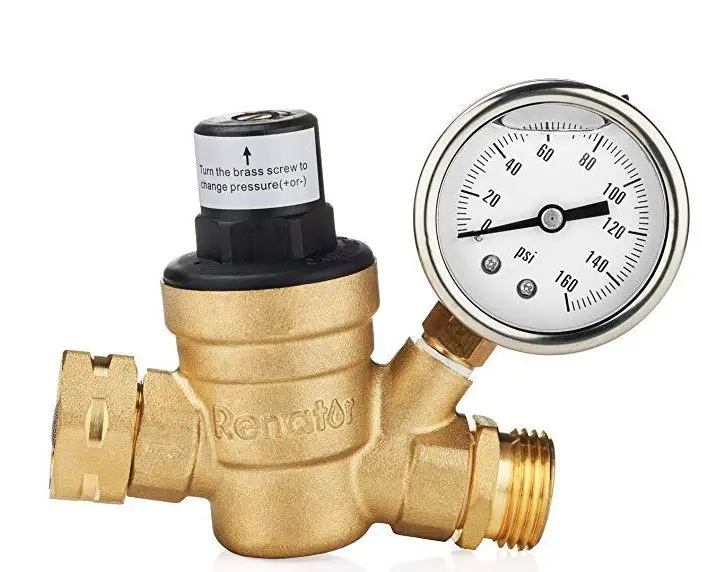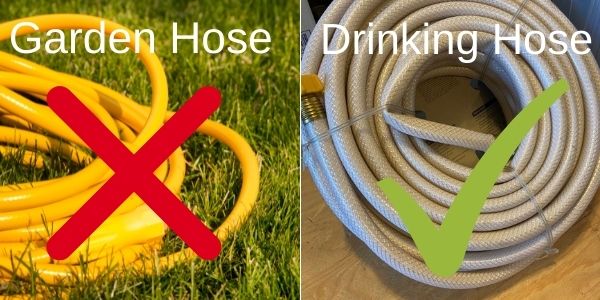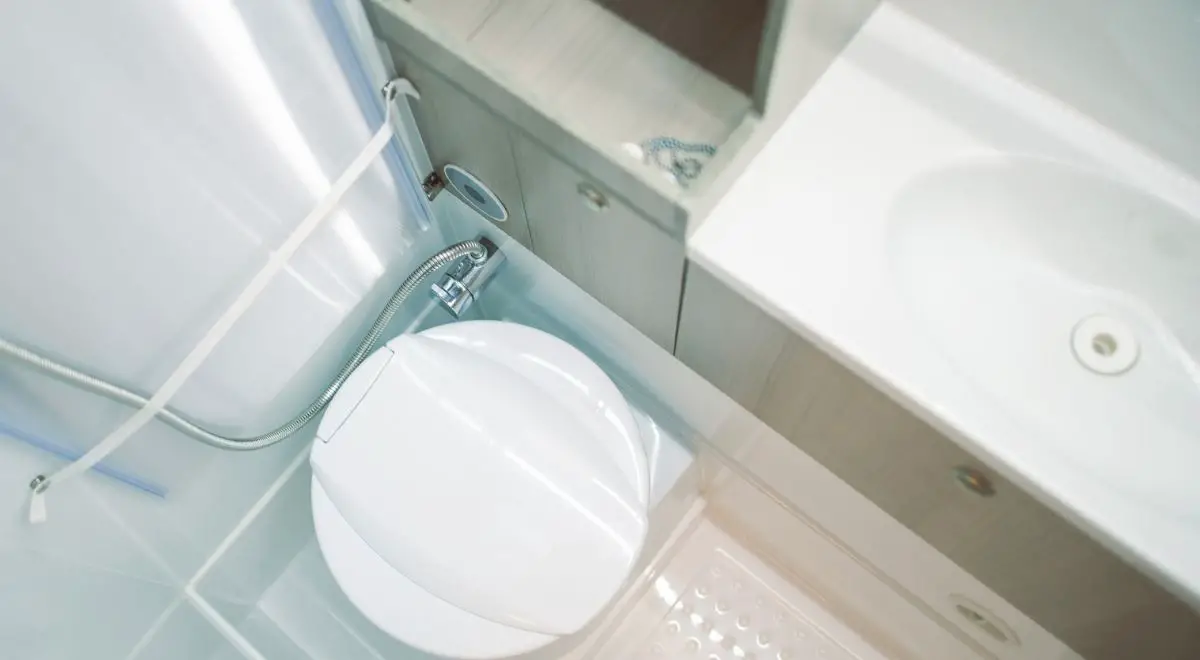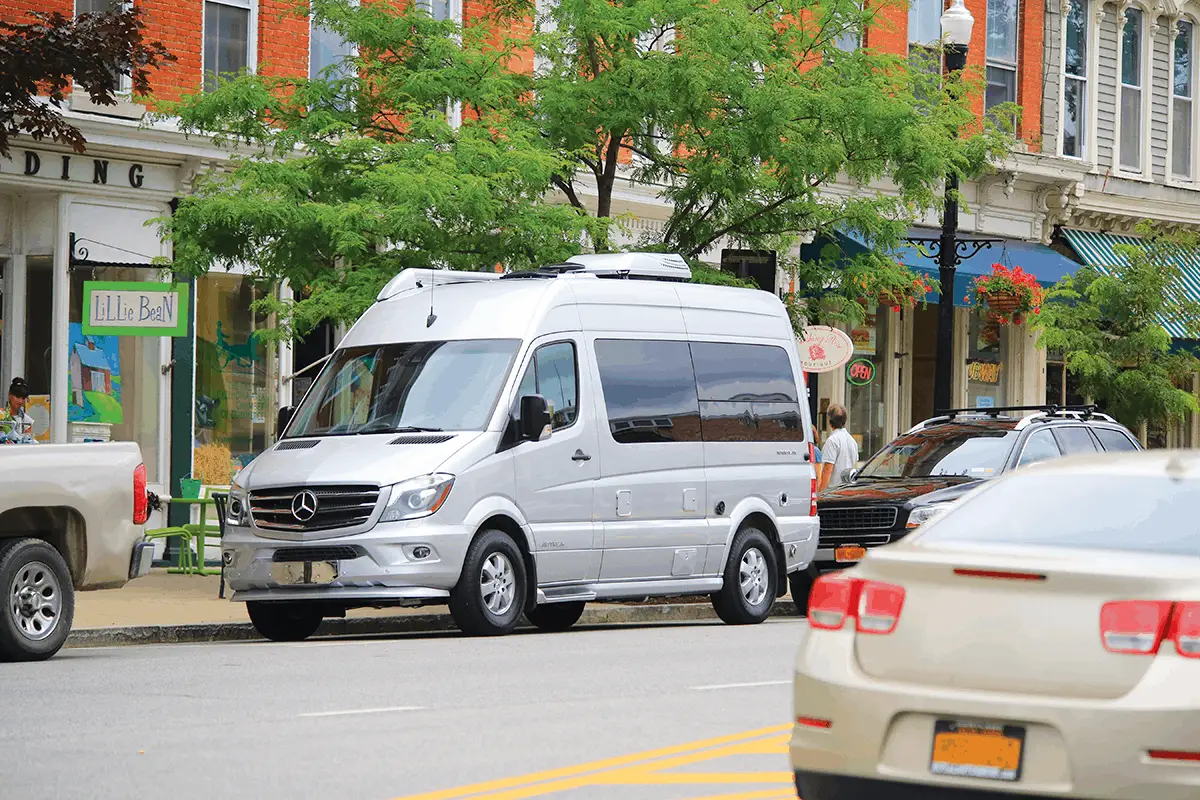Setting up primary services when you pull up to a campground, is essential to a great stay. You have your power hooked up, and you are about to hook up your water supply.
Do I really need a water pressure regulator for my RV? A water pressure regulator acts as for your RV’s plumbing system against any unknown water pressure spikes your rig might experience a campsite or municipal water. The Water pressure regulator is placed between the water sources and your RV. A typical RV’s water system can handle 40 to 50 psi, while many newer RVs can handle 100 psi.
Many large campgrounds can have 100 psi plus as well as some municipal water system. If you hook up to the campground water supply and the pressure is too high, you risk severe damage to your camper.
Let’s dig into this question a bit more, so I can show you the need for a water pressure regulator and what the best-reviewed regulators are.
What is a water pressure regulator?
A water pressure regulator or water pressure reducing valve (PRV) is a mechanical device that fits between the water source and your RV. It reduces and regulates the fluctuations in water pressure from the source.
Fluctuations from high (150 psi) to low (30 psi), then high (150 psi) water pressure can cause bursts in your RV water system. The water pressure regulator reduces the source water pressure to (on a fixed regulator) 40 psi or any adjusted water pressure of your choosing (adjustable water regulator). Fluctuations in water pressure from the source is tamped down to below the pressure set on the water regulator. It is not recommended to set your water pressure regulator to any higher than 60 psi.
Where does the water pressure regulator go?
The water pressure regulator is places right on the spigot of the source the water, then a RV water safe drinking hose is attached to the water regulator, and that hose is connected to your Rig. The water regulator does not go on your RV or should there be a hose that goes into the regulator and then another hose to your RV.
What is the proper water pressure for my RV?
The Correct water pressure in an RV should not have a water pressure of more than 60 psi. If you have an older RV, the pressure recommendation is no more than 45-50 psi. A lot of the newer rigs advertise that they can hold a load of 100 psi through the plumbing system, but experts warn that this is an unnecessary risk and to keep your psi at 60 or less.
Why is a Water regulator necessary?
Many large campgrounds and municipal water systems have really long runs with hoses underground to get water to the last valve at the end of the run. When you pull up into your campsite, you never know if you are closer to the water supply or are closer to the end of the water line.
If you happen to hook up your Rig into the system and you are closer to the supply side, the water pressure might be 150 psi, which could blow your RVs water pipes, or you could be on the last leg of the campground and your water pressure is only 30 psi.
Adjustable regulator or fixed regulator, which is right for you?
Fixed Water Regulator
Adjustable Water Regulator
With adjustable regulators, you can adjust the water pressure whenever it needs to be adjusted, so if the water pressure is lower at a campsite, it can be adjusted to allow greater PSI, but only to what the campsite is set at.
So if a campsite’s water pressure is at 35 psi, you can adjust it to allow for the maximum psi on the regulator and if there happens to be a spike in pressure, you are still protected. You cannot increase the psi beyond what the campsite has it set at.
With fixed water pressure regulators, the presser is kept at a steady 40-50 psi by using a flow restrictor if the water pressure is lower, say 35 psi, it will not adjust for a lower pressure. You would just have to remove the water pressure regulators to adjust for the lower pressure. Then if there is a spike in PSI, I guess you hope your Rigs water system can handle the increased pressure and does not blow.
How To increase water pressure in my RV?
There is 2 ways you can increase the water pressure in your RV.
1. If you are using an adjustable water regulator, you can just turn the dial on the regulator to increase the water flow in your RV. The maximum water pressure that you can increase the water flow is capped by the actual water pressure of the source of water. So if you are at a campsite with a water pressure of 40 psi, and the water flow is low, you can increase it to only 40 psi and no higher.
2. The other way to get better water pressure or increase the water pressure is to have your pump of your RV turned on when you are connected to an external source, this way the water will be augmented with your freshwater tank to increase the waterflow out of your tap or your shower.
This will drain your freshwater tank in your RV if you use this method throughout the day. This method does not work for all RVs some have a by pass that does not allow for on board water and external water to run at the same time.
If these two methods does not increase the water pressure, then there might be a blockage in other parts of your water RV water system. How to troubleshoot your RV water problems
How do I turn the water pressure down on my water regulator?
If you are using an adjustable water regulator, you just turn the dial to decrease the water pressure down to below 60 psi. The ideal range is 40 to 50 psi for all RVs even the newer ones on the market.
If you are using a fixed water regulator and the water pressure is too high, then it is time to replace it as it appears to have failed.
How do I know my water pressure regulator is bad?
Water pressure regulators will eventually fail and how one can tell if it’s time for a replacement can easily identified. For both types of water pressure regulators, if If the valve is leaking water from any part of the system it’s time for a replacement. On Adjustable systems, if you turn the adjustable dial on the valve and the water pressure does not go down or up, then its failed. It’s most likely a regulator in the value is bad.
Why gambling with a Fixed Regulator is a bad idea!
The inability to predict water pressure through the campground hookups is the reason why you can’t rely on a pressure gauge alone.
When you check the pressure in the morning when most of the campground is awake and getting their day started by taking showers, doing dishes, or making coffee, the pressure is going to be lower because there is more demand at that time of day.
Now, on the flip side, if you check the pressure at night when everyone has finished their day and are just sitting around relaxing or even sleeping, the pressure is higher because there is almost no demand for water at that time.
So, if you want to use a gauge only system, the only way to get accurate pressure readings is to be out there reading your meter all day and night. It would be easier and more efficient to hook up a water pressure regulator.
plastic vs brass water regulators?
When it comes to a basic water regulator, its not recommended, its always better to go with a brass one with dial and meter to know what the water pressure is of the source of your water. The plastic ones tend to leak and break down faster than the brass versions.
Choosing The Right Water regulator
The choice is easy since it is typically below $50. The one that I use is the Renator M11-0660R Water pressure Regulator. It’s adjustable and gives you the best control over the water pressure no matter where you plug into.
If you don’t want to spend the extra if you are in a pinch, the Camco 40052 water pressure regulator will suffice. The cost is usually below $20.
Can I use a garden hose rather than a specific RV water hose?
RV specific hoses are made with materials that do not leach chemicals into the water that passes through it. These are safe drinking hoses. Garden hoses that have been sitting in the sun, will break down and leach chemicals into the water. The chemicals in garden hoses can make you sick. Many of the garden hoses contain lead, BPA, Phthalates, not to mention that bacteria and mold that might grow in your garden hose.
Not convinced? A study conducted by ecocentre back in 2016 found that garden hoses are filled with all kinds of chemicals in them.
Summary
Now, you can see how leaving your water pressure regulation to fate can cause costly repairs to your camper, so for peace of mind, purchasing and using a water pressure regulator makes sense.
There are many choices available, so do your research and choose the regulator that makes the most sense for your coach and your budget. If you need specialized help, consider speaking to a reputable parts dealer to find answers to your more comprehensive questions.

